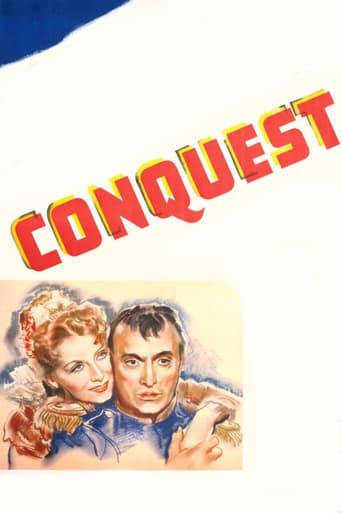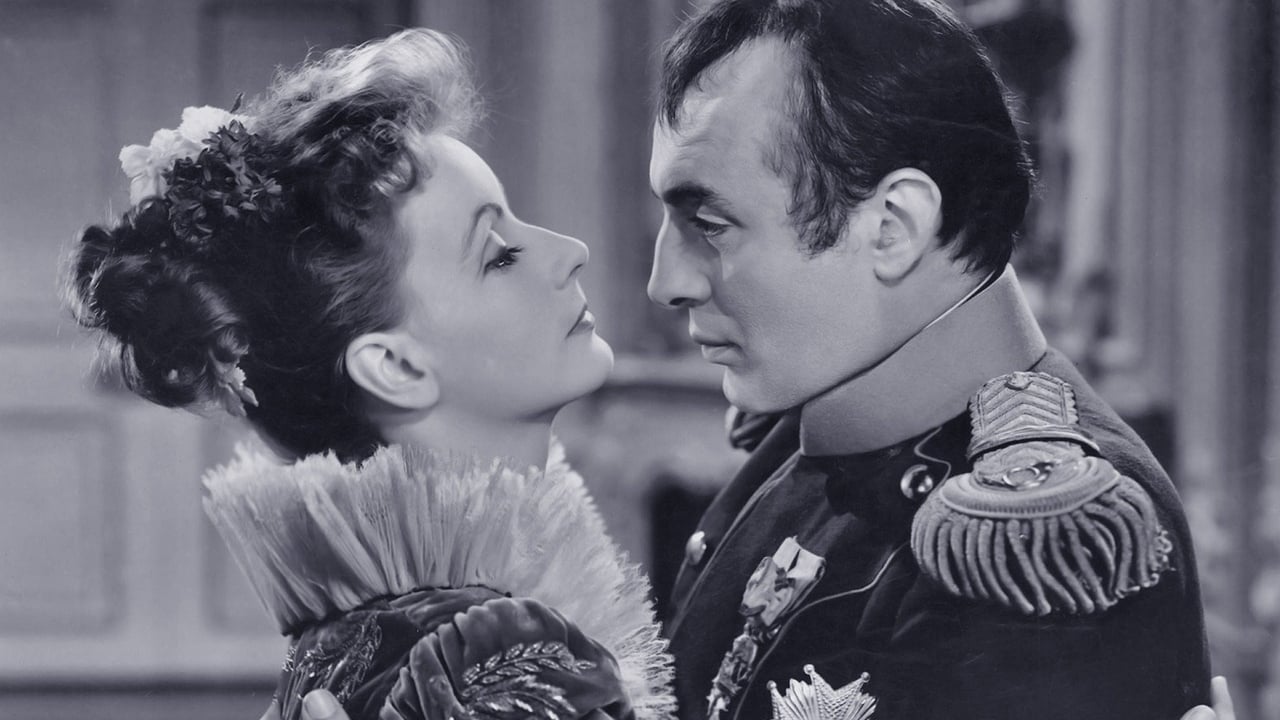MartinHafer
This film reminded me of another MGM costume drama--MARIE ANTOINETTE. Both were late 30s MGM epics with lavish costumes and the full MGM treatment (the typical high-budget music, dialog, pacing, direction, etc.). And, both were pretty boring--at least to me. Now I know these films were well-received at the time and they both starred MGM divas (Norma Shearer in MARIE ANTOINETTE and Greta Garbo in CONQUEST), but didn't change the fact that these were very stagy and unengaging films. To put this in some perspective, I love movies from Hollywoods Golden Age and I am a history teacher and I still was bored to tears by the films. I think it is films like these that got students to really hate history! My advice--watch a documentary about Napoleon or watch a romance but don't combine the two into a static and unappealing film like this.
raymond-15
Considering this film is getting on for 70 years I must say it has stood the test of time exceptionally well. The art director has excelled himself with the very impressive sets and the black & white format captures the sad mood of those times when Poland was under the heel of almighty Russia. This is made clear in the opening sequence when the Russian soldiers invade the Walewski palace on horseback trampling and destroying the beautiful interior. Countess Maria (Greta Garbo) realizing the sorry state in which Poland finds herself agrees to plead with the French Emperor Napoleon Bonaparte (Charles Boyer)to save her country and give it independence.The dialogue which follows and continues through much of the film sounds very much like a series of political speeches, but even so Napoleon is mesmerised by this beautiful and sad Countess. They fall in love and spend as many nights together as his military manoeuvres permit. She divorces her husband the aging Count Walewski.Having seen this film I have come to believe that Charles Boyer IS Napoleon. He looks the part, acts with authority. struts about in his uniform and never goes out of character. Whenever i think of Napoleon in the future I will think of him as portrayed in this film. Although it is his film, Greta Garbo does have her moments. Watch her suppressed happiness as she is about to announce her pregnancy and the anguish that follows when Napoleon informs her of his intention to marry an Austrian Princess to produce a royal heir.This film is predominently a love story (and all the dialogue is imagined by the screen writers). It is not a documentary on the life of Napoleon and thankfully the war scenes are kept to a minimum. As for the love interest I believe the scenes they played together could have had more warmth and intimacy. It was not until little Alexander appeared that I was aware of any true love in their lives.
stills-6
This movie has two halves to evaluate. The first half is brilliant, among the best scenes ever put on film. Boyer gives the performance of his life as the "Little Corporal" trying to woo an obscure (and obscurely beautiful) Polish Countess. Sadly, once she is wooed the movie is lost in a muddle of syrupy sentiment and questionable history lessons.Boyer is outstanding all the way through the movie. This is the role he was born to play. He is funny, abrupt, insane, and believeable. He puts his whole body into this role. But Garbo - *sigh* - she's better at portraying melancholy than happiness. When she's in love in this movie, it's irritating. Excepting her scene with Dame May Whitty as Napoleon's mother, I just can't stand it.The second half is just mush. It's plodding, for the most part uninteresting, and sheds no light on Napoleon as a historical figure. Maybe the first half of the movie had so much energy that it was impossible to sustain. In any case, I recommend this movie, if only for Boyer's performance and the opening sequence.
Arthur Hausner
Some scenes in this film drag on too long and others are too wordy, but I thoroughly enjoyed Charles Boyer's performance as Napoleon Bonaparte. His slight accent accentuates believability. The same can be said about Greta Garbo's slight accent, but she is so stunningly beautiful I hardly noticed. She is also excellent in her last dramatic performance. There are two great scenes to watch for: the opening attack of the cossacks, riding their horses inside the stately home of Garbo and Henry Stephenson and wrecking it; and the ball at the palace in Warsaw, filled with noblemen and noblewomen adorned in gorgeous period clothing. (The gowns were designed by Adrian). Both crowd scenes are handled very well by director Clarence Brown. I was a little disappointed in the limited screenplay. Somehow, when I think of Napoleon I think of a grand epic such as "War and Peace," and not just his personal life. The only part of his war life you see is a brief scene of his retreat from Moscow in the harsh Russian winter. I was impressed by Napoleon's vision of a United States of Europe. He would have been delighted at the introduction of the Eurodollar this year.


 AD
AD



